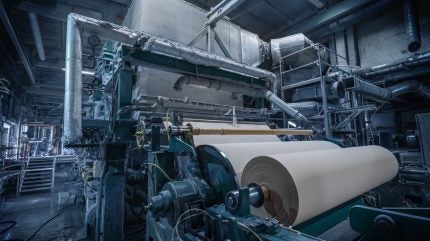
The Karnaphuli Paper Mill (KPM) is set to undergo a revival under a BDT360bn ($3bn) project, as reported by The Business Standard.
This initiative aims to fully repair the facility and establish six new plants within five years, potentially revitalising a sector that has faced numerous challenges.
The Bangladesh Chemical Industries Corporation (BCIC), under which KPM operates, has submitted an investment proposal to the Ministry of Industry, according to KPM Operations general manager Md Mahidul Islam.
The project includes plans for an integrated paper mill, afforestation projects, and a paper-based chemical plant.
It also encompasses factories for various basic chemicals and synthetic polyester fibre.
Mahidul Islam said: “The initiative will make KPM self-sufficient and profitable. Once the new plants are running, the factory will not only meet its own needs but also export raw materials.”
KPM has experienced a decline in production capacity over the past decade and a half, due to outdated machinery, a lack of skilled manpower, mismanagement, and internal issues.
The revival plan for KPM was formulated after the appointment of a new managing director, Mohammad Shahid Ullah, an expert in bamboo and pulpwood.
Following his appointment, KPM employees called for the mill’s revival under new management, demanding an end to the syndicate linked to the previous administration.
Currently, KPM’s workforce has dwindled to 260 employees from a previous total of 5,000 a decade ago, with many workers transferred to other BCIC facilities due to the mill’s dire condition.
Shahid Ullah said: “KPM is a very old and traditional mill. Since I joined, I found that much of the old machinery is nearly unusable, with some already beyond repair. To resume full-scale production, KPM has submitted a proposal to the Ministry of Industry through BCIC.
“This includes plans for the mill’s complete revival, the establishment of six new plants, and the implementation of seven projects.
“If the necessary funds are allocated, the factory will be able to produce 1 lakh tonnes of paper annually.”
Officials highlight that production costs remain high as local bamboo and tree collection has ceased, necessitating reliance on old paper and costly imported pulp.
Under Shahid Ullah’s leadership, a seven-phase tender was introduced to source foreign pulp more affordably, reducing costs from BDT105,000 per tonne to BDT85,000 per tonne.
With no pulp in stock, the factory has been using domestic wastepaper and pulp from the open market to maintain operations temporarily.
The new revival project aims to produce its own raw materials to lower production costs and plans to sell these materials to private paper mills, creating a new revenue stream.



